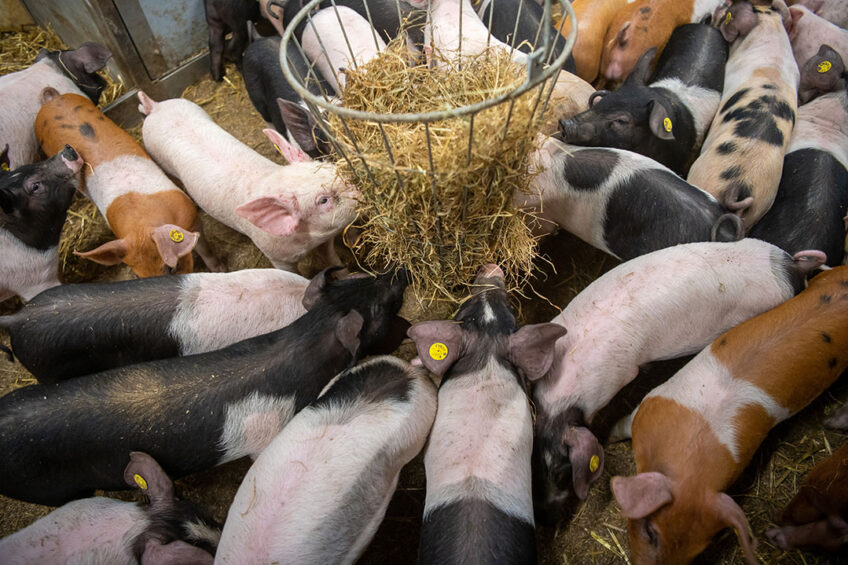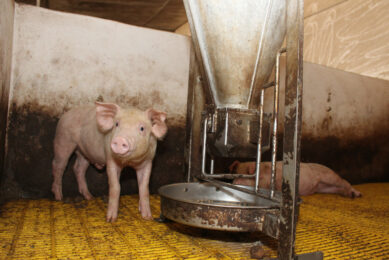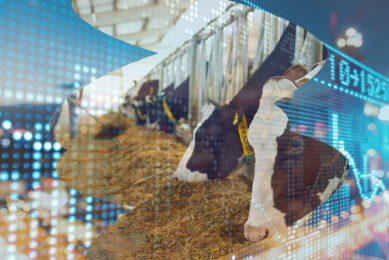Amino acids: The missing link in the tail biting debate?

Reducing protein levels in pig feed appears to be a logical thing to do for various reasons – but is it wise from a nutritional and behavioural perspective? Researchers in the Netherlands zoomed in on the link between nutrition and welfare. In a newly published research they explored the effects of low protein diets on tail biting – and what role amino acids play.
The tendency to reduce protein levels in pig feed has been gaining more traction of late, for various reasons.
- Availability. To achieve adequate protein levels in pig feed, often ingredients such as soy need to be shipped around the world. In 2024, perhaps that might not always be the most logical thing to do.
- Price: As global demand for feed ingredients continues to rise, ingredients such as these tend to become increasingly expensive.
- Environmental and sustainability point of view: There is a growing need for engineering smarter (i.e. local) feed formulations to meet animal demands. Recently, in the Netherlands and Belgium, another reason for reducing protein levels emerged. High protein levels in feed also tend to lead to higher levels of undigested protein and higher nitrogen excretion via urine, which leads to higher ammonia levels in pig manure and emissions into the environment. Both countries have in recent years hit their legal limits with regard to nitrogen emissions, leading to court cases and protests.
Lower protein diets result in welfare complications

Reducing protein levels, however, is easier said than done. A change in diets might have serious complications in the pig house, as any change of diet will likely become noticeable. For instance, previous research already showed that low protein diets can result in welfare complications. However, what was not yet investigated was whether amino acid supplementation could overcome the negative effect of low protein diets on behaviour. Ilaria Minussi, PhD candidate in the field of animal nutrition at Wageningen University & Research (WUR) in the Netherlands explored exactly that question in a study on the effects of low protein diets with amino acid supplementation on tail biting in pigs.
Study set-up
For the study, in total 575 grower-finisher pigs were followed from 10 weeks of age until slaughter, at 94 days after they had been brought into the experimental farm. The animals were subdivided in 4 groups of 12 pens. Each received one of the following treatments:
(A) A normal diet with regular levels of crude protein;
(B) A low protein diet (20% reduction of the level of crude protein and standardised ileal digestible (SID) lysine (Lys), methionine (Met), cysteine (Cys), threonine (Thr), tryptophan (Trp), valine (Val), isoleucine (Ile), leucine (Leu);
(C) A low protein diet (-20%), but with regular levels of SID Lys, Met + Cys, Thr, Trp, Val, Ile, and Leu due to supplementation of free amino acids;
(D) A low protein diet (-20%) in combination with extra environmental enrichment.
Lower feed intake, higher activity level

The study showed lower feed intake in 2 of those 4 groups: the pigs receiving a low protein diet (B) and the pigs receiving a low protein diet with extra enrichment (D). In addition, the activity level of the pigs fed only a low protein diet (B and D) was higher than the pigs that were fed the other diets (A and C). Those pigs also showed more tail biting behaviour and more tail wounds than all the other groups.
Dr Liesbeth Bolhuis is associate professor in behavioural physiology at WUR. She explains why pigs engage in more damaging behaviour when receiving a low protein diet: “When there is a deficiency of nutrients such as protein and essential amino acids, the pigs will sense this and this may be one of the reasons why they eat less. You would expect that increasing feed intake would make up for the deficiency, but that’s not what happens. Consequently, pigs will increase their foraging behaviour and activity, likely in search for an alternative feed source to cope with the deficiency. This behaviour can be redirected to their pen mates, resulting in more damaging behaviour.”
It seems that enrichment is not always the solution for reducing tail biting.
The effect of enrichment
In the study the team also looked at the effect of enrichment. After all, 2 groups of pigs received the same deficient low protein diet, yet one group was housed in a commercial setting, with a jute bag, tube with straw briquette and chain, whereas the other group received extra enrichment in the pen, i.e. a rope with nodes, a wooden beam and 350 g of chopped straw daily.
The results of the trial showed that in the starter phase the extra enrichment worked as tail biting problems were kept under control despite the low protein diet. However, at some point, the lack of sufficient levels protein overtook the effect of the enrichment, even though pigs were still interested in the supplied materials, and cases of tail biting increased.
Minussi says: “It did not help enough to keep the tail biting low. It seems that enrichment is not always the solution for reducing tail biting.” Dr Bolhuis adds: “It’s a multifactorial problem; enrichment is definitely very important, but in the long run not enough when the pigs are fed low protein diets. The extra enrichment did, however, reduce ear biting behaviour throughout the whole experiment.”
…amino acid supplementation helps prevent the negative behavioural effects of a low protein diet.
The role of amino acids
One of the key research questions was whether amino acid supplementation could counteract the negative effect of low protein diets on tail biting. The experiments did show promising results as the level of tail biting and occurrence and severity of tail wounds in the pigs receiving regular diets (A) versus low protein diets supplemented with amino acids (C) was equal. Minussi says, “In the low protein diet group we saw an increase in interaction with the enrichment, to cope with the deficiency. However, this effect was gone when the pigs received additional amino acids, meaning that amino acid supplementation helps prevent the negative behavioural effects of a low protein diet.”
There were no differences in performance, body weight gain and feed intake between the pigs fed regular diets and pigs fed a low protein diet with amino acid supplementation. Ilaria Minussi continues, “In terms of performance there is no difference, but environmentally there is.”
Further studies are needed to delve deeper into the effect of individual amino acids on damaging behaviour. According to the researchers there might be a link between tryptophan and behaviour, something that has also been shown in previous studies. Tryptophan is a precursor for serotonin, an important neurotransmitter that affects mood and, as a consequence, behaviour. So far, other amino acids have not yet been studied in relation to damaging pig behaviour. Subsequent studies by WUR will therefore build on exploring those roles in more detail.
Stress main risk factor
Even though it is clear that amino acids can play a role in reducing damaging behaviour, stress remains a main risk factor, concludes Dr Bolhuis: “When you provide the best feed, but the pigs are stressed, they will still engage in tail and ear biting. The pigs must feel safe and their behavioural needs must be met, as hampering the display of behaviours such as exploration and foraging causes chronic stress. The main thing is to ensure the lowest possible amount of chronic stress and to prevent severe acute stressors. Providing an attractive environment with ample enrichment materials helps pigs to handle stress.”
The research article “Amino acid supplementation counteracts negative effects of low protein diets on tail biting in pigs more than extra environmental enrichment,” published in Scientific Reports (2023), was authored by I. Minussi, W.J.J. Gerrits, A.J.M. Jansman and J.E. Bolhuis, Wageningen University & Research, the Netherlands; R. Gerritsen, ForFarmers, Lochem, the Netherlands; J.J. Zonderland, De Heus Animal Nutrition, Ede, the Netherlands; and W. Lambert, Metex Nøøvistago, Paris, France.
Join 26,000+ subscribers
Subscribe to our newsletter to stay updated about all the need-to-know content in the feed sector, three times a week. Beheer
Beheer











 WP Admin
WP Admin  Bewerk bericht
Bewerk bericht